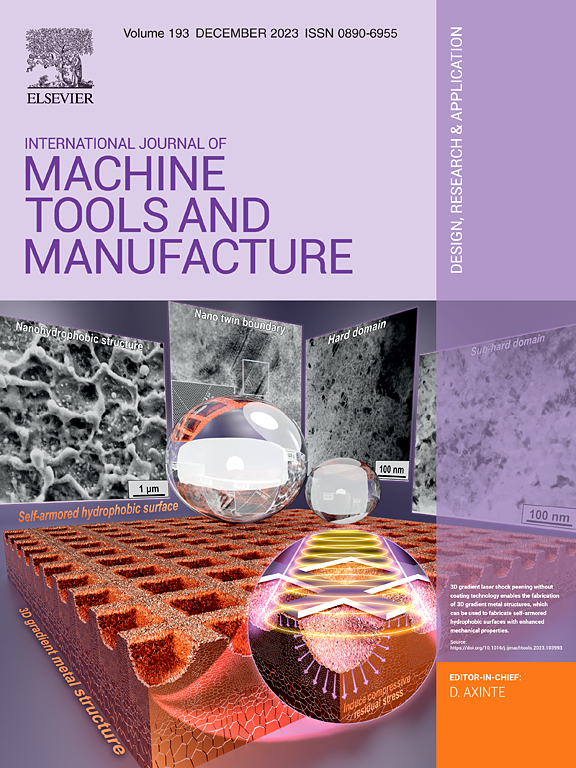A novel continuous dynamic recrystallization model to reveal grain refinement mechanism in constraining ring rolling of thin-walled conical structure with inner ribs
IF 18.8
1区 工程技术
Q1 ENGINEERING, MANUFACTURING
International Journal of Machine Tools & Manufacture
Pub Date : 2025-02-07
DOI:10.1016/j.ijmachtools.2025.104255
引用次数: 0
Abstract
Constraining ring rolling (CRR) is an integral and near net-shape forming approach to fabricate the seamless ring aluminum components in aerospace field. The service property of the formed ring components mainly depends on the microscopical grain texture. However, investigation and modeling of microstructure evolution in this complex hot working processes are not appropriately performed, which hinders further control of the forming quality of components during CRR. In this study, by analyzing the characteristics of CRR process and deformation modes in different characteristic zones of typical thin-walled conical ring with inner transverse ribs (TWCRITRs), a continuous dynamic recrystallization (CDRX) model of aluminum alloy that considers the influence of thermal deformation history was firstly proposed. The developed CDRX model was integrated into the finite element (FE) to predict microstructure evolution throughout the entire hot working process. The optimal parameters of the CRR process were obtained with the uniformity and fineness of microstructure as the goal, guiding the subsequent forming experiment. The predicted shape and microstructure agree well with the experimental results. It is found that the grain refinement mechanisms of 2A14 Al-alloy TWCRITRs during CRR include CDRX and thin grain cutting CDRX. Due to the low-angle grain boundaries (LAGBs) being pinned by the upper and lower high-angle grain boundaries (HAGBs), the recrystallization efficiency in the thin grain cutting CDRX is higher than that in the traditional CDRX mechanism. The shear deformation at thin-wall and complex deformation at the corner promotes the occurrence of thin grain cutting CDRX mechanism with a higher recrystallization efficiency. Eventually, the mechanical properties of manufacturing TWCRITRs met the requirements. All of these provide additional insights into the shape and microstructure controlled CRR process for TWCRITRs.

建立了一种新的连续动态再结晶模型,揭示了带内筋薄壁锥形组织约束环轧晶粒细化机理
约束环轧制是航空航天领域制造无缝铝环件的一种整体近净形成形方法。成形的环形构件的使用性能主要取决于微观晶粒织构。然而,对这一复杂的热加工过程的微观组织演变进行研究和建模的研究并不充分,这阻碍了进一步控制零件在CRR过程中的成形质量。本研究通过分析典型内横肋薄壁锥形环(TWCRITRs)的CRR过程特点和不同特征区的变形模式,首次提出了考虑热变形历史影响的铝合金连续动态再结晶(CDRX)模型。将所建立的CDRX模型集成到有限元(FE)中,以预测整个热加工过程中的组织演变。以组织的均匀性和细度为目标,获得了CRR工艺的最佳参数,为后续的成形试验提供了指导。预测的形状和微观结构与实验结果吻合较好。发现2A14铝合金TWCRITRs在CRR过程中的晶粒细化机制包括CDRX和细晶切削CDRX。由于低角度晶界(LAGBs)被上下高角度晶界(HAGBs)钉住,薄晶切削CDRX的再结晶效率高于传统CDRX机制。薄壁处的剪切变形和拐角处的复杂变形促进了薄晶切削CDRX机制的发生,具有较高的再结晶效率。最终,制造的twcritr的力学性能达到了要求。所有这些都为twcritr的形状和微观结构控制CRR工艺提供了额外的见解。
本文章由计算机程序翻译,如有差异,请以英文原文为准。
求助全文
约1分钟内获得全文
求助全文
来源期刊
CiteScore
25.70
自引率
10.00%
发文量
66
审稿时长
18 days
期刊介绍:
The International Journal of Machine Tools and Manufacture is dedicated to advancing scientific comprehension of the fundamental mechanics involved in processes and machines utilized in the manufacturing of engineering components. While the primary focus is on metals, the journal also explores applications in composites, ceramics, and other structural or functional materials. The coverage includes a diverse range of topics:
- Essential mechanics of processes involving material removal, accretion, and deformation, encompassing solid, semi-solid, or particulate forms.
- Significant scientific advancements in existing or new processes and machines.
- In-depth characterization of workpiece materials (structure/surfaces) through advanced techniques (e.g., SEM, EDS, TEM, EBSD, AES, Raman spectroscopy) to unveil new phenomenological aspects governing manufacturing processes.
- Tool design, utilization, and comprehensive studies of failure mechanisms.
- Innovative concepts of machine tools, fixtures, and tool holders supported by modeling and demonstrations relevant to manufacturing processes within the journal's scope.
- Novel scientific contributions exploring interactions between the machine tool, control system, software design, and processes.
- Studies elucidating specific mechanisms governing niche processes (e.g., ultra-high precision, nano/atomic level manufacturing with either mechanical or non-mechanical "tools").
- Innovative approaches, underpinned by thorough scientific analysis, addressing emerging or breakthrough processes (e.g., bio-inspired manufacturing) and/or applications (e.g., ultra-high precision optics).

 求助内容:
求助内容: 应助结果提醒方式:
应助结果提醒方式:


